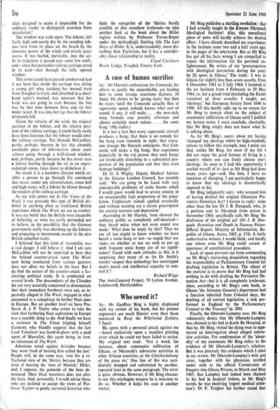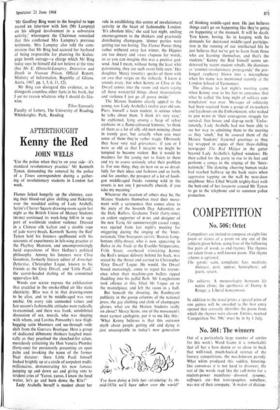Who sowed it?
Sir: Mr Geoffrey Bing is highly displeased with my review of his book, but his present arguments are much flimsier even than those mustered in Reap the Whirlwind (Letters, 7 June).
He opens with a personal attack against me —based exclusively upon a manifest printing error which he could not have failed to notice. My original text read: `Not a word, for instance, about communist infiltration of Ghana, or Nkrumah's subversive activities in other African countries, or the Gleichschaltung of the press etc.' One line of this was acci- dentally dropped and substituted by another, repeated later in the same paragraph. The error is quite obvious. However, if Mr Bing-chooses to use this misshapen weapon he is welcome to do so. Whether it helps his case is another matter. Mr Bing publishes a startling revelation: that I had actually taught in the Kwame Nkrumah Ideological Institute! Alas, this sensational piece of news will hardly achieve the desired effect: I have already described my experiences in the institute some two and a half years ago, in the pages of the SPECTATOR. But as Mr Bing has got all his facts wrong I am compelled to repeat the information for his personal en- lightenment. He writes of my 'preoccupation with ideological instruction during the years he [I] spent in Ghana.' The truth: I was in Ghana for slightly less than seven months, from 6 December 1963 to 3 July 1964; I lectured at the KN Institute from 4 February to 29 May 1964, i.e. for a grand total (excluding the Easter vacation) of three months; I taught, not `ideology,' but European history from 1640 to 1900. All this hardly adds up to an excuse for Mr Bing to remain silent on the subject of communist infiltration of Ghana until I publish my lecture notes. I must conclude, charitably, that Mr Bing simply does not know what he is talking about.
As for Mr Bing's sneers about my having 'changed' my ideology whilst he high-mindedly refuses to follow this example, may I point out that, unlike Mr Bing, for most of my life I did not enjoy the good fortune of living in a country where one can freely choose one's ideology. As soon as I had this opportunity I availed myself of it—just as. Mr Bing had done many years ago—and, like him, I have no intention of changing. I am particularly happy to know that my ideology is diametrically opposed to his.
Mr Bing indignantly asks : who accused him of having drafted the original Ghanaian Pre- ventive Detention Act? I hasten to reply: none other than the late Dr J. B. Danquah, who, in a petition sent to Nkrumah from prison in November 1964, specifically calls Mr Bing 'the draftsman of the original act' (Dr I. B. Dan- quah. Detention and Death in Nsawan Prison. Official Report. Ministry of Information, Re- public of Ghana. Accra, 1967, p. 174). A fairly authoritative witness, I would think, and hardly one whom even Mr Bing could accuse of ignorance of constitutional procedure.
Lack of space prevents me from commenting on Mr Bing's interesting disquisition regarding the responsibility of Parliamentary Counsel for drafting legislation in Britain. The object of the exercise is to prove that Mr Bing had had nothing to do with drafting the Preventive De- tention Act—but it is all completely irrelevant, since, according to Mr Bing's own book, in Ghana 'the Attorney General's department had a function inherited from Colonial days, the drafting of all current legislation, a task per- formed in England by the Parliamentary Counsel to the Treasury' (p. 209).
Finally, the Obetsebi-Lamptey case. Mr Bing vehemently denies that Mr Obetsebi-Lamptey was chained to his bed in Korle Bu Hospital, or that he, Mr Bing, visited the dying man to tape- record an interrogation about alleged subver- sive activities. For confirmation of the 'absur- dity' of my statements Mr Bing refers to the evidence of Mr Obetsebi-Lamptey's relatives. But it was precisely this evidence which I cited in my review. Mr Obetsebi-Lamptey's wife and sister, together with his physician, testified under oath to the official Commission of Enquiry into Ghana Prisons, in March and May 1967, that Lamptey had indeed been chained to his bed in hospital (where, in Mr Bing's words, he was receiving 'expert medical atten- tion'). Dr F. Toigbor Sai further stated that `Mr Geoffrey Bing went to the hospital to tape record an interview with him (Mr Lamptey) on his alleged involvement in a subversive activity,' whereupon the Chairman remarked that this confirmed Mrs Lamptey's previous testimony. Mrs Lamptey also told the com- mission that Mr Bing had accused her husband of being responsible for planning the Kulun- gugu bomb outrage—a charge which Mr Bing today says he himself did not believe at the time (See Mr E. Obetsebi-Lamptey. Detention and Death in Nsawan Prison. Official Report. Ministry of Information, Republic of Ghana. Accra, 1967, pp. 1, 5, 6, 11, 12).
Mr Bing can disregard this evidence, as he disregards countless other facts in his book,. but I see no reason whatever why I should do like- wise.
Tibor Szamuely Faculty of Letters, The University of Reading, Whiteknights Park, Reading







































 Previous page
Previous page